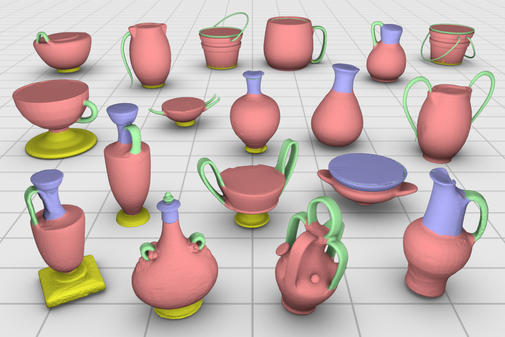Geometry processing (COMP 5900Y) - Winter 2015

Outline
Recent advances in acquisition technologies (such as laser scanning) have facilitated the digitization of 3D objects with high resolution and accuracy. To address the challenges that arise from handling and using such complex data, the field of geometry processing has evolved. This course covers the latest concepts, representations and algorithms in the field, to address the acquisition, reconstruction, analysis, manipulation, editing, and fabrication of complex 3D models. The covered techniques have applications in computer graphics, engineering and many other areas, while the field is still the subject of much active work and presents opportunities for future research.
Topics
- Surface representations and mesh data structures
- Mesh reconstruction
- Mesh smoothing and fairing
- Mesh simplification and compression
- Parameterization
- Mesh editing and deformation
- Shape analysis
- 3D printing and fabrication
Learning outcomes
At the end of this course, students will be able to:
- Summarize the main problems and solution methods in the field of geometry processing.
- Identify the most suitable techniques to address specific problems in geometry processing.
- Implement algorithms for processing of polygonal meshes and apply them to specific datasets.
Pre-requisites
Experience with C++ programming, familiarity with linear algebra (vectors, matrices, etc.), and eagerness to study mathematical concepts and algorithms. Familiarity with computer graphics and/or computer vision and/or image processing are a plus.
Recommended book
M. Botsch, L. Kobbelt, M. Pauly, P. Alliez, and B. Levy, "Polygon Mesh Processing", A K Peters/CRC Press, 2010.
We will follow this book closely in the course. Each topic will also have additional references and suggested readings.
Lectures
Tuesdays and Thursdays, 2:35pm-3:55pm, Southam Hall 515.
Grading
The grade will be based on a paper presentation, assignments and a final course project.
Instructor
Oliver van Kaick.
You can find more information about the course (such as a detailed list of topics) at cuLearn. You can also e-mail me at Oliver.vanKaick at carleton dot ca for any questions regarding the course.
University Policies
Student Academic Integrity Policy: Every student should be
familiar with the Carleton University student academic
integrity policy. A student found in violation of academic
integrity standards may be awarded penalties which range
from a reprimand to receiving a grade of F in the course or
even being expelled from the program or University. Some
examples of offences are: plagiarism and unauthorized
cooperation or collaboration. Information on this policy
may be found in the Undergraduate Calendar.
Plagiarism: As defined by the Senate, "plagiarism is
presenting, whether intentional or not, the ideas,
expression of ideas or work of others as one's own". Such
reported offences will be reviewed by the office of the
Dean.
Unauthorized Cooperation or Collaboration: Senate policy
states that "to ensure fairness and equity in assessment of
term work, students shall not co-operate or collaborate in
the completion of an academic assignment, in whole or in
part, when the instructor has indicated that the assignment
is to be completed on an individual basis". Please ask the
course instructor regarding concerns on this issue.
Academic Accommodation: You may need special arrangements to
meet your academic obligations during the term. For an
accommodation request, the processes are as follows. For
more details visit the Equity Services website:
http://www.carleton.ca/equity/
Pregnancy Obligation: write to me with any requests for
academic accommodation during the first two weeks of class,
or as soon as possible after the need for accommodation is
known to exist.
Religious Obligation: write to me with any requests for
academic accommodation during the first two weeks of class,
or as soon as possible after the need for accommodation is
known to exist.
Academic Accommodations for Students with Disabilities: The
Paul Menton Centre for Students with Disabilities (PMC)
provides services to students with Learning Disabilities
(LD), psychiatric/mental health disabilities, Attention
Deficit Hyperactivity Disorder (ADHD), Autism Spectrum
Disorders (ASD), chronic medical conditions, and impairments
in mobility, hearing, and vision. If you have a disability
requiring academic accommodations in this course, please
contact PMC at 613-520-6608 or pmc@carleton.ca for a formal
evaluation. If you are already registered with the PMC,
contact your PMC coordinator to send me your Letter of
Accommodation at the beginning of the term, and no later
than two weeks before the first in-class scheduled test or
exam requiring accommodation (if applicable). After
requesting accommodation from PMC, meet with me to ensure
accommodation arrangements are made. Please consult the PMC
website for the deadline to request accommodations for the
formally-scheduled exam (if applicable) at
http://www.carleton.ca/pmc/new-and-current-students/dates-and-deadlines/
You can visit the Equity Services website to view the
policies and to obtain more detailed information on
academic accommodation at http://www.carleton.ca/equity/
Medical Certificate: The following is a link to the official
medical certificate accepted by Carleton University for the
deferral of final examinations or assignments in
undergraduate courses. To access the form, please go to
http://www.carleton.ca/registrar/forms/